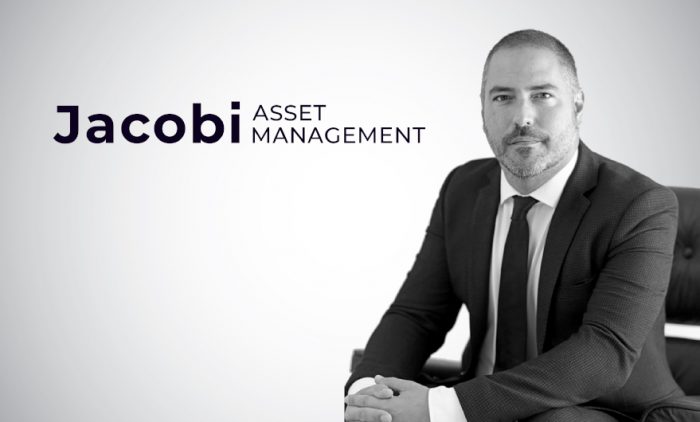LeapRate Interview… We sat down with Jacobi Asset Management Founder and CEO Jamie Khurshid to talk about the focus of the company, recent approval from GFSC, Bitcoin ETFs, the importance of regulation of digital assets and what to expect in 2022.
Khurshid founded the digital asset management company Jacobi in March 2021. He also serves as Chief Operating Officer of Nukkleus, a digital asset advisory & multi asset exchange execution services provider since August 2021 and Co-founder and COO of the Caduceus Foundation since November 2021.
LR: Hi Jamie and thank you for joining LeapRate today! Can you first tell us more about Jacobi Asset Management and its main focus?
Jacobi Asset Management (Jacobi) was created to fill a gap in the market structure. With a strong background in investment banking and regulation, Jacobi’s focus is providing a safe and regulated solution for digital assets and cryptocurrencies.
Bitcoin is easily the most recognised cryptocurrency globally. It is in high demand but also at risk of manipulation by crypto whales. We have worked closely with the regulators to prove we have a suitable and appropriate structure for investors to feel their investment is safe and secure. By bringing our product to market, we expect more widespread adoption which should dampen the impact of the manipulative behaviour exhibited by the whales. We have worked with Fidelity Digital Assets, a best-in-class custodian from traditional capital markets, and investment is available today through tier-one partners.
LR: Jacobi recently received approval from GFSC for the Bitcoin ETF launch. Can you tell us what is the significance of this approval?
Jacobi is the first and only regulated ETF in Europe. The regulatory approval was provided and authorised by the Guernsey Finance Services Commission (GFSC). This approval demonstrates the high level of service and security Jacobi can provide, not yet seen in the European market.
There are several other cryptocurrency exchange-traded products available; however, not all products are built the same. Many firms that issue ETNs are regulated businesses; however, the ETN product itself is not. The structure of our regulated ETF is where the strength of Jacobi Asset Management lies, having the GFSC regulate both the firm and the product.
LR: Please tell us how Bitcoin ETFs differ from Bitcoin Futures ETF/ETNs.
There is a growing miscommunication in the market around the categorisation of Bitcoin Futures and Cryptocurrency ETNs, reviewing these products as if they have the same structure as Bitcoin ETFs. Our ambition as a firm is to educate the market on these differences and dispel the misinformation being thrown at institutional investors today.
ETFs are easier to understand than most people think; their structure is similar to a traditional equity-like instrument, where an ETF shareholder owns units of the fund that itself owns and holds the underlying asset.
Futures ETFs, however, are made up of derivatives and do not hold the underlying asset and so have a higher risk factor.
ETNs are even riskier as they are unsecured debt so the investor does not own any portion of the underlying asset. As such, there is a significant risk to ETN investments if the issuer defaults or is not able to repay the investor. Additionally, many ETNs are not priced in real-time; they can be leveraged, the assets can be loaned out and investments can be difficult to access or exit quickly, leaving the investor at a disadvantage.
LR: Can you tell us why the regulation of digital assets is important for the industry?
Regulation is essential to bringing a sense of security and stability to the market. Cryptocurrency is still in its infancy and we have seen plenty of volatility since it first emerged. We hope that digital assets can progress further for institutional investors with more knowledgeable regulators reviewing these innovative products.
For our target audience, we believe regulation is about opening up access to this new space. ETFs will be seen as the initial, safer and more secure option to begin investing in cryptocurrency products as the market matures and more institutional investors understand the opportunity.
LR: What big developments in the industry have you observed in 2021? What can we expect in 2022?
For both us as a fund and looking at the overall market, 2021 was just the beginning. We are representing Europe pushing a new era of digital asset investing ahead of the noise coming out of the US.
We anticipate 2022 to be a record-breaking year on several fronts as the Jacobi ETF scales not just across the European market but with the support of our network of feeder funds across the world. We also plan to expand our offering into other cryptocurrency ETF products, so planning on a very busy and exciting year ahead.
LR: Any new company plans you would like to share with us?
Investment managers looking to buy Bitcoin in a regulated instrument can meet their own mandate requirements and gain safe, secure exposure to the performance of Bitcoin. These investments are available today through our team with additional investment routes opening in early 2022.
As a team, we are also exploring access to the fund from outside of Europe to help meet the global demand for a spot Bitcoin ETF and other crypto ETF products.
It will be a very exciting time over the next few months, so watch this space!
